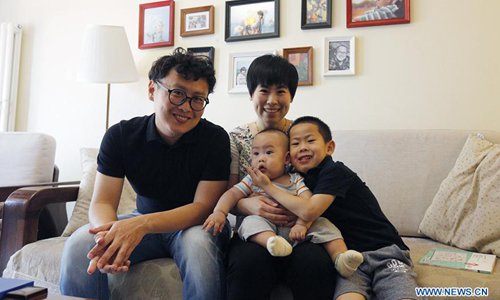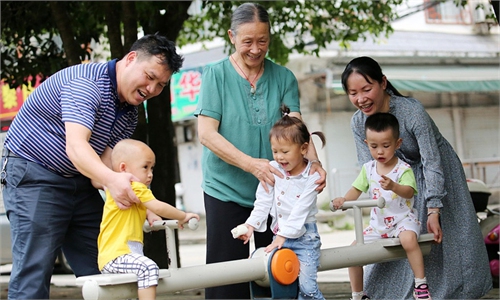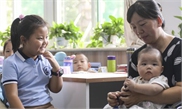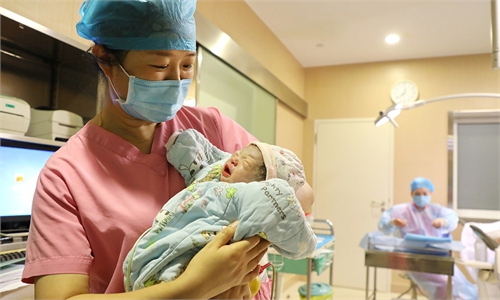
Song Dan and her family pose for a group photo at home in Beijing, capital of China, May 13, 2017. About 17.23 million babies were born in 2017, of which 51 percent have an older sibling, according to the National Health and Family Planning Commission. However, the total number of births fell by about 630,000 compared with 2016 while percentage of the population aged over 60 rose from 16.7 percent in 2016 to 17.3 percent in 2017. (Xinhua/Zhang Yuwei)
A county in Northwest China's Gansu Province recently announced to disburse subsidies of up to 40,000 yuan ($6,211) for couples who give birth to two or three children. The money is for buying houses, making the county China's first to introduce real estate subsidy under the third-child policy which was legalized in August.
Besides the house-buying subsidy for third-child families with Linze county's permanent household registration, Linze government plans to offer subsidy of up to 10,000 yuan per baby every year for local families with two or three children, until the babies turn 3 years old.
Raising 11 supporting policies towards families with two or three children, the government of Linze county released the trial implementation on Tuesday, which sets allowances for maternal and child health services, for infant care services and for children education.
The decreasing permanent population in Linze leads to the introduction of these supporting polices, said Jia Yongming, staff of Linze county-level health bureau. He told Beijing Youth Daily that the local government has carried out surveys and symposiums on the local procreation situations and fertility desire.
According to the survey, the three top discouraging factors for families to have more than one child are the pressure on housing, education and infant care. These encouraging policies of the trial implementation aims at solving these concerns, Jia explained.
The policy on home-buying subsidy for third-child families in Linze country sets a very good example nationwide, Mu Guangzong, a professor from the Institute of Population Research at Peking University, told the Global Times.
"I believe more cities in China will put forward similar policies to improve fertility desires and birth rate, with larger subsidies possible in cities of east China," said Mu.
Linze is not the first place to offer cash to families that have two or more children since the implementation of the third-child policy. Panzhihua in Southwest China's Sichuan Province, announced in late July cash handouts of 500 yuan ($76.87) per baby every month for local families that have a second or third child, until the babies turn 3 years old.



